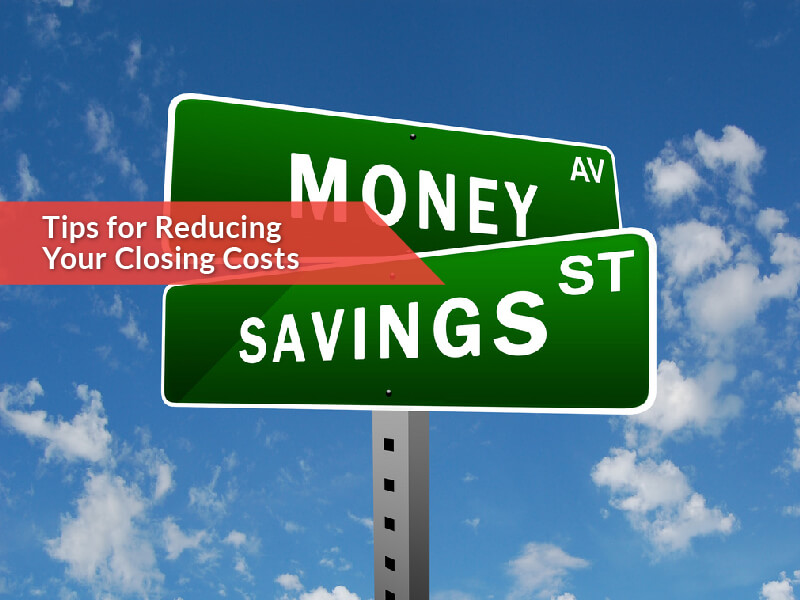Whenever there is a loan transaction, fees are incurred and the parties related to the transaction need to be paid. We know that paying fees is never an enjoyable experience, but there are ways to reduce the amount you have to pay! We present you with five ways to reduce the closing costs on your next mortgage transaction. Read them below!
1. Negotiate a Seller Credit
A seller credit is an additional sum of money paid by the seller for the buyer to use toward closing costs. Think of it as a cash back program; the seller uses it to entice buyers to purchase their property.
What you’ll need to do:
Have your real estate agent request a seller credit in Section Q of the purchase contract. Keep in mind, there’s no guarantee that the seller will agree to give the seller credit. Also, if there are many offers on the property, it can potentially make your offer look weak. However, when done properly, receiving a seller credit can dramatically reduce your closing costs (or possibly pay them entirely).
2. Reduce Prepaid Interest
Prepaid interest is the interest a buyer must pay to the lender at closing to cover the interest due from the day the lender funds the loan until the start of the next month. The prepaid interest cost will vary depending on the interest rate, loan amount, and the date the loan funds. For example, if the loans funds on the 16th of the month, 15-16 days of prepaid interest will need to be paid at closing. If the loan funds on the 29th, there will only be 2-3 days of prepaid interest. For a $400,000 loan at a 3.375% interest rate, prepaid interest will be about $37/day.
What you’ll need to do:
When negotiating your contract, have your real estate agent request a closing date as close to the end of the month as possible. With a closing date of the 31st, you’ll have a funding date of the 29th. In this case, you’ll only need to pay 3 days of prepaid interest which will save you a bundle in closing costs. Yet, delays to the funding of your loan may push the closing date into the beginning of the next month. If this happens, your prepaid costs may increase, so be aware.
3. Escrow & Title Insurance Discounts
When you purchase a property, the Escrow Fee and the Title Insurance Premium are a couple of the biggest closing cost expenses. One little known fact is that local escrow companies offer discounts on both their escrow fees and their title policies upon request. These discounts can range from 25% – 50% off.
What you’ll need to do:
Inquire with your lender or real estate agent OR go directly to the escrow company and ask to see their applicable discounts. In Hawaii, title insurance premiums and discounts are actually filed with the State Insurance Commissioner.
Here are the discounts offered by most local escrow companies:
- US Armed Forces Rate (25% discount) – applicable for military homebuyers. Some companies may offer this discount to all government employees.
- First Time Homebuyer Rate (25% discount) – applicable for homebuyers who have not owned a property in the last 3 years.
- Investors Rate (30% discount) – applicable to buyers engaged in the business of purchasing property as an investment.
- Senior Citizens Rate (25% discount) – applicable for those at least 62 years of age or older.
- One-Year Residential Financing Rate (50%) – applicable for those buying a property in which title insurance was issued to the seller within the prior twelve months of the transaction. Typically, you must purchase title insurance with the same company where the seller purchased their insurance to get this discount.
4. Lock a Rate With a YSP
YSP stands for Yield Spread Premium. Whenever a buyer locks in a rate, that rate will either come with a cost (discount points) or a rebate (Yield Spread Premium). If your goal is to have the lowest rate and lowest payment possible, then you’ll typically have to pay discount points to buy down your interest rate. If you’re more concerned about keeping closing costs down, you can request to lock in a higher rate and get a YSP or rebate pricing to help cover some or all of the closing costs.
Brenda Carr, one of our most knowledgeable VA Loans Specialists here at Hawaii VA Loans, explains more about this tip to reduce your closing costs:
“You can lock at a slightly higher interest rate to obtain rebate/credit points which can be applied to cover some, if not all, of your closing costs. This will make your $0 down loan a $0 money due at closing loan as well.”
What you’ll need to do:
With most loan scenarios, you’ll likely have the option to lock at multiple rate and point combinations. A sample scenario on a $400,000 loan amount may be the following:
- 3.250% rate, paying 1 discount point or $4000
- 3.375% rate, paying 0 discount points or $0
- 3.625% rate, giving you 1% rebate or $4000
By choosing the 3.625% rate, you’ll be able to use the $4,000 rebate to reduce your closing costs. Again, you’ll just have to decide what’s more important for you: having a cheaper mortgage payment or paying less upfront in closing costs?
5. Use a VA Loan
One of great benefits offered to military homebuyers is the ability to have reduced closing costs. There are a number of closing costs that cannot be paid by the servicemember or veteran when using a VA loan (they are commonly referred to as VA non-allowables), saving them between $1500 – $2000 at closing.
Let’s hear directly from a veteran right here within our company. VA Specialist, Brad Vilgos, served in the Navy and is currently an airman in the Hawaii Air National Guard. Brad purchased his Hawaii home with a VA loan:
“As Veterans ourselves, my wife and I were able to buy our dream home here in Hawaii using our VA Home Loan Guarantee. Without this option we might have been saving our down payment for many more years and continued renting while doing so. Taking advantage of these 5 ways to reduce your closing costs, you’re able to fully utilize the 100% financing with little to no down payment.”
We’re proud to have experienced VA specialists and veterans like Brad working with us!
What you’ll need to do:
First off, you need to be a veteran or active duty to be eligible for a VA Loan. If that’s you, contact us through our website or call us at 808-792-4251 and one of our experienced VA Loan Specialists will help you pull your Certificate of Eligibility to get you started on the VA loan process.
There you have some great tips to help you reduce your closing costs. If you take advantage of at least a few of them, you’ll be well on your way to saving a bunch of money on your next mortgage transaction!


